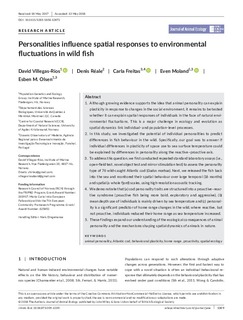| dc.description.abstract | Although growing evidence supports the idea that animal personality can explain plasticity in response to changes in the social environment, it remains to be tested whether it can explain spatial responses of individuals in the face of natural environmental fluctuations. This is a major challenge in ecology and evolution as spatial dynamics link individual‐ and population‐level processes.
In this study, we investigated the potential of individual personalities to predict differences in fish behaviour in the wild. Specifically, our goal was to answer if individual differences in plasticity of space use to sea surface temperature could be explained by differences in personality along the reactive–proactive axis.
To address this question, we first conducted repeated standard laboratory assays (i.e., open‐field test, novel object test and mirror stimulation test) to assess the personality type of 76 wild‐caught Atlantic cod (Gadus morhua). Next, we released the fish back into the sea and monitored their spatial behaviour over large temporal (16 months) and spatial (a whole fjord) scales, using high‐resolution acoustic tracking.
We demonstrate that (a) cod personality traits are structured into a proactive–reactive syndrome (proactive fish being more bold, exploratory and aggressive), (b) mean depth use of individuals is mainly driven by sea temperature and (c) personality is a significant predictor of home range changes in the wild, where reactive, but not proactive, individuals reduced their home range as sea temperature increased.
These findings expand our understanding of the ecological consequences of animal personality and the mechanisms shaping spatial dynamics of animals in nature. | nb_NO |
